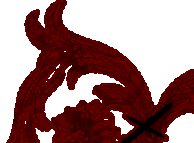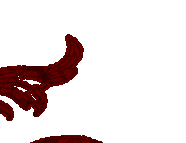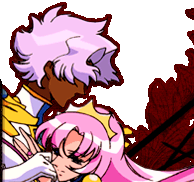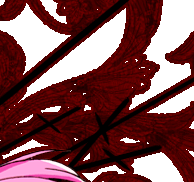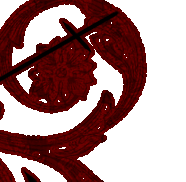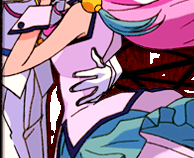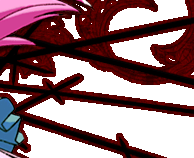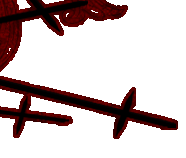
In my school, the student council was voted in by a popularity
contest and was essentially a bunch of cheerleaders sitting in a room
talking about hair spray. The Seitokai at Ohtori Academy have bigger
things to worry about, and with the gravity of their responsibilities,
it’s safe to assume their joining the council was more serious
as well. We’re given no convenient flashbacks to explain the
recruiting process the Seitokai underwent, but we can rely on vague
recollections and deductive reasoning to give us some idea. The traditional
school-wide election, if done at all, was a formality. Akio would
never leave his pieces to be moved by children, and the Seitokai was
no volunteer operation. These people took convincing.
A few lines exchanged in episode two do tell us something about
this process:
Miki:
and the illusionary castle appeared, just as the letters said.
Juri:
I know.
Juri:
I could never quit once I saw that spectacle.
Touga:
True. The Ends of the World writes in the letters ---
Touga:
"The one who wins a series of Duels and becomes engaged to the
Rose Bride,
Touga:
shall eventually reach the castle and receive the power to revolutionize
the world."
Touga:
And so, we must keep fighting.
The Rose Signet is, with exception to Utena, considered the symbol
of a contract made with Ends of the World. Saionji expresses surprise
in episode 1 that Utena bears it despite not being on the Seitokai,
and much later, in episode 22, it’s noted that Ends of the
World must back the Black Rose duelists or they wouldn’t wear
his signet. This indicates that membership on the Seitokai and involvement
in the dueling game was a joint offer. The two are unequivocally
combined in the minds of the council, falling under the same umbrella
of responsibility and reward.
We know the identity of Ends of the World is hidden from the duelists.
The way Miki and Touga speak here, it sounds like their letters
just appeared out of nowhere with a ring and instructions on how
to duel, and that upon their compliance, everything, their membership
on the Seitokai and the dueling game, fell into place. Juri’s
comment supports what you can then assume: the theatrics of the
arena were used as proof Ends of the World was serious.
What motivated them to test his claims rather than laugh over
the absurdity of an illusory castle and a Bride with a magical sword?
There’s a certain ambiguity surrounding the initial motives
of the duelists. We know what they’re chasing now, but that
leaves the question of what was going through their heads when they
decided not to throw that first letter in the trash.
None of the duelists can be summed up quite as well as Touga.
He saw power and grabbed it. He’d have required the least
encouragement; upon hearing his job title, he was in. Touga wants
to do and be everything, and though he climbs the ladder, he’s
convinced a spot’s waiting vacant for him at the top. It’s
his birthright. He would have jumped either offer, the Seitokai,
or the dueling game. Both? He’d be on that faster than a fangirl
on SephirothXCloud shounen-ai.
Drive and ambition in such excess doesn’t come out of thin
air. In a series that puts so much emphasis on psychological development,
we’re given little to work with concerning where Touga got
this extraordinary power-lust. Most of the characters are given
a fleshed out late childhood to explain their personality. Miki
had his psychotic sister, Juri had her infatuation with Shiori,
and Saionji had Touga. But what’d Touga have? We don’t
get any flashbacks in the show meant specifically for him. Though
he appears in several, he’s never the character the scene
is explaining; in the flashback to Utena’s coffin, though
Touga plays no small part in it, Saionji is center stage. He appears
a major player in all of the Saionji and Nanami flashbacks, and
so needs none of his own to illustrate who he was at the time.
Who was he? Exactly who he is in the show. Plainly he had an early
start with this god complex, so we have to leave the safety of flashbacks
and go to his formative years.
We spend
most of the series watching Touga live a life of luxury. He does
this so well that even when we’re told otherwise, it doesn’t
always sink in that Touga was not born with a silver
spoon in his mouth. Here’s what we can assume by circumstance:
Touga and Nanami were born to a poor family. The nature of this
family beyond their eventual inability to raise Touga and Nanami
is unknown, but secondhand evidence tells us it was a loving environment.
Children seen to be show-offs are rarely simply that—Touga’s
flaunting started out as a way to garner attention and approval.
He had far too much drive and determination in this pursuit to be
someone chasing a dream or a longing otherwise foreign to them.
Touga remembers what caring and love feel like—emotions certainly
never experienced at the hands of his current parents, who by all
evidence regard their children as trophies. It also seems odd that
his parents would wait until he was four and send off both siblings.
The only reason they’d have waited so long would have been
to sell a beautiful youth on the black market in his prime. Yet
had that been the case, they’d have done the same with Nanami,
who was too young at the time to sell to the same buyers Touga would’ve
attracted. Instead, it’s more likely they wanted to keep their
children but found the second to be too much. Faced with the hard
reality, they decided it better to not separate the children, and
sent them away in hopes they’d have a better life in a wealthy
home.
It probably didn’t take Touga long to realize that (with
ironic exception to the Kiryuus themselves) he had a talent for
getting love and adoration from others. This is a sweet high for
anyone, and it would have been doubly so for Touga. So he devoted
himself to it. Nanami wears the scars of this ambition still, as
evidence fingers her for one of the young Touga’s lab rats.
Success after success after success, and by the flashback of him
and Saionji finding Utena, Touga’s been feeding off the attention
others pay him for so long he no longer relies on or needs it. He
simply expects it.
Touga considers himself the top of the food chain. The power,
the money, the women—these aren’t symbols of his greatness,
because he doesn’t need anything or anyone to tell him what
he already knows. Touga doesn’t pursue anything in an effort
to inflate or confirm his ego anymore. Instead, he claims these
things not as prizes, but as endowments naturally befitting a man
of his standing. A woman whispering adorations in his ear tells
him nothing he doesn’t already know, she’s there simply
because a man in his position has such things. (Also, he likes sex.)
That’s the state of mind he had when he accepted. The highest
position a student can hold in school politics? Leading members
of an ultra-secretive group fighting for a prize no one else knows
exists? Being the speaking voice of the ominous taskmaster behind
it all? Of course he should do all these things. He’s Touga
Kiryuu, and it’s his right to claim the head of every table.
And that whole Power of Dios thing? Yeah, the kids can toss it around
all they want. He knows it belongs to him.
 Touga isn’t
the only member of the Seitokai with a superiority complex. He’s
just the only member whose superiority complex isn’t built
on a foundation of termite infested balsa wood. To hear Saionji
tell it, being on the Seitokai and possessing the Rose Bride are
glories meant for him alone, because he’s the best and he
deserves it and he’s fucking awesome. Sadly,
no one is less convinced of this than he is. In fact, if not for
his rabid competition with aforementioned president, it’s
unlikely Saionji would’ve successfully convinced himself he
was worth the position at all. It’s no stretch to imagine
Saionji being offered a place in the Seitokai before Touga and shrugging
it off as ridiculous frippery unworthy of time he could devote to
his swordsmanship. That’s the nature of Saionji’s dismal
self-esteem. He plays patronizing and acts as though everything
is below him, because to give worth to anything will make his loss
of it all the more crushing. However, glutton for punishment as
he is, he can’t resist a chance to lock horns with (and get
owned by) Touga. The odds are high that Touga’s newly acquired
position was dangled in front of Saionji to convince him to sign
on to the Seitokai.
Aside from his need to compete with Touga, Saionji took VP for
the prestige and honor that comes with the title. Ironically, Saionji
is uninterested in the actual power his position affords him. The
ego doesn’t come from the influence he has, but that it marks
him as special. His special uniform, his special signet, his special
title—he’s not drunk with power, he’s drunk with
status. Saionji’s the kid in Boy Scouts that had all the badges.
Not because he enjoyed earning them, but because he enjoyed being
seen wearing them. This is the same motivation behind leading the
kendo club, though kendo is an exception in Saionji’s life
where he actually does have an ego to speak of. He earns his accolades
in competition and he knows it, though even there it’s a bittersweet
victory at best. He only dominates that arena because Touga doesn’t
play in it—a point Saionji makes with no small amount of bitterness.
Saionji was drawn to the Seitokai for the status high. His motivation
to duel stems from a desire to ‘see something eternal’.
Touga offers an explanation for this during Saionji’s ride
in the Akio Arc: Saionji wants eternal friendship. A lot of things
changed in Saionji’s life that fateful day in the church.
It exposed him, in a most brutal way, to the lack of permanence
in life. Saionji was introduced to death, but what he remembers
is the end of the friendship he’d shared with Touga.
As a child, Saionji was an innocent. If he had a slightly rough
home life, he was still woefully ignorant to realities harsher than
his father’s temper. A stark contrast to Touga, who’s
driven by more than curiosity when he uncovers the coffin Utena’s
hiding in. This is a trend that continues into the series—Saionji
still has a juvenile innocence about him that Touga lacked from
the beginning. Despite the school he goes to, the friend he holds
dear, and the ruthless woman he loves, Saionji is genuinely surprised
by every act of cruelty he sees—especially the ones he causes
himself. Years of exposure have yet to dull the hurt Saionji feels
when Touga looks down on him or when Anthy ignores him. Saionji
was made to look at something he wasn’t ready to see, and
rather than scab over and heal, every harsh reality and moment of
cruelty Saionji witnesses opens the wound anew.
Saionji learned that nothing lasts forever, including the friendship
he cherished so much as a child. Utena poses to them the challenge
of showing her something eternal and Touga walks away, accepting
that he can’t do this. Eternity is a child’s fantasy,
and Touga takes it as a matter of reason that there is no such thing.
Saionji is at the same loss Touga is to show Utena something eternal,
but he clings helplessly to the idea that such a thing exists, just
out of his reach. He’s realized he needs something eternal
too, and he can’t relate to Touga’s coldness concerning
it.
Despite
having absolutely nothing to do with Utena’s change of heart,
Touga flashes a smug and self-satisfied grin to see her out and
about the next day. Saionji’s world crumbles as he takes this
to mean Touga did know of something eternal, and
that he showed it to Utena, a stranger, rather than to his best
friend. Saionji felt betrayed, and in that moment came to understand
that his best friend hid things from him, used him, and would ignore
him if he were so inclined. By this point in their friendship, Touga
has begun to pick at Saionji’s flaws, and being no idiot for
all that he’s a fool, Saionji saw this. Though they still
associate, this marked the end of anything that could be called
a genuine friendship between them, and Saionji in the series knows
quite well Touga abuses him and keeps him around for laughs and
schemes. (The fact of the matter is Touga needs Saionji just as
much as Saionji needs Touga. They spend most of the series dancing
around this, and finally accept it in the end.)
“Only
by winning her in a duel can I defeat him.”
Saionji saw in the dueling game yet another kendo hall. Another
battleground to fight Touga on. They were equals. Best friends.
He loved Touga once, in the happy, all-encompassing friendship of
youth. Now he chases in desperation and hope any chance to show
Touga his worth, that he might come to respect him as an equal again.
Most in his position would simply lament the loss of innocence.
Saionji sees now how the world is, he knows his eternal friendship
isn’t plausible, and he knows what he is to Touga. However,
most aren’t given the chance to be duelists, and rather than
mourn for days gone by, Saionji grasped the faint possibility that
something that makes him happy can last for all time. Never ending
in death or betrayal or the parting of ways. For all he hates himself
enough to think he doesn’t deserve it, like everyone else,
he just wants to be happy. Forever.
Miki is by far the hardest case to argue. The early episodes of
the series paint him to be a reluctant duelist, and most everyone
else agrees his place is in the piano room, not the arena. The game
they play was not the draw for Miki. He joined the Seitokai first
and foremost, and the duels became the baggage that weighed down
the benefits of his position.
He appears to be a record keeper, who on top of transcribing the
meetings, is seen to time them. This is a tedious job requiring
patience no one else on the Seitokai can spare. Miki was drawn to
this position in part because it suited him. Despite his shyness,
Miki has enough self-esteem to realize where and when his abilities
can best be applied. He can do this job better than anyone else.
Though Miki shines in the classroom and the music room, his ego’s
more invested in the former than the latter. For whatever reason,
scholastic prowess has greater value for him than musical genius.
Miki blushes and shrugs off most of the adoration he gets from his
piano playing, but he’s more headstrong and proud when someone
compliments him concerning his test scores. How it would look on
a college application to have been on the Seitokai was no doubt
prominent in his mind when he agreed to it. To say it never crossed
anyone else’s would be a lie—Touga in particular would
have appreciated how shiny his position would make his resume look.
However, in Miki’s case alone it would’ve been a primary
motive—partly for his resume, partly for his ego, and partly
for his parents that ignore him anyway. The rest of them just make
their college apps happen. Only Miki would toil over it.
There aren’t many stereotypically ‘good’ people
in the series; most of the cast is at the very best 100% self-centered
and at the very worst 100% sadistic. Miki is neither of these. He
has a genuine humanitarian bent, and membership in the Seitokai
would have appealed to him for the opportunity it gave to help his
fellow classmates. One of the primary functions of a student government
body is to be the voice for the needs and wants of the school, which
is something Miki would regard as a calling. Touga wanted power,
Saionji wanted status—Miki didn’t see either of these
benefits before he saw the responsibility that invariably comes
with the position.
Nothing catches Miki’s interest like responsibility. The
events illustrated in his flashbacks set the standard for a habit
Miki indulges rabidly over the course of the series. He feels obligated
to take responsibility for everything. It’s all his fault,
and it’s all his problem to fix. His intentions in joining
the Seitokai were good, he wanted to help his peers, but he was
driven largely by his sense of duty. He saw a chance to take on
a huge responsibility and put himself in a position to horde blame,
so he took it. Noblesse oblige, with great power comes great responsibility,
etc, etc. Miki feels his talents place on him the burden of aiding
others.
As for the dueling game…Miki doesn’t quite get it.
The other members of the Seitokai (save Nanami) have a very specific
idea of what the Power of Dios is to them, and what they would do
with it. Miki lacks this. His primary understanding of the Power
of Dios is that his peers in the Seitokai want it, so it must really
be great and totally worth pursuing. As for himself, he’s
not quite sure what he wants to do with it. It could be said this
is in part because he doesn’t believe he can get it, but despite
being a genius, the bottom line is Miki’s too young and in
a pool that’s too deep. He has no idea in hell what he’d
do with the power to revolutionize the world. Would he return Kozue
to her original innocence and rebuild their sunlit garden together?
Would he capture Anthy for himself? Would he wish for world peace?
He wasn’t sure; he just realized it would be a very nice thing
to have.
In the first
arc, Miki’s fighting for ‘Anthy’s music’.
Skipping hours of analysis, let’s agree to summarize: He wants
to have Anthy for himself. Those two episodes center largely around
Miki’s realization of this—he had a
crush on her from the beginning, but it wasn’t until these
events took place that Miki finds his ‘shining thing’.
At this point, his sexual regards are still aimed almost entirely
at Kozue, so those were likely the conditions he began dueling under.
This negates the possibility that he began dueling because he liked
Anthy and wanted to get closer to her.
By the Akio Arc, Miki’s started to get a few ideas as far
as what to do with the Power of Dios, but for most of the series,
and certainly before it, Miki awkwardly stands among the duelists
in pursuit of something he’s not quite sure he knows what
to do with. The dueling game is a ‘grown-up’ thing to
do, and despite his distrust of older grown-ups, he looks up to
the rest of the Seitokai, especially Touga, as role models. The
way he sees it, if they all want the Power of Dios so much…well
it must be worth it.
 Touga’s the president, Saionji’s the vice-president,
and Miki’s the record keeper. Juri’s role in the Seitokai
is also well defined: Juri is the group’s ambassador. It’s
her that manages the gossip chain and intelligence network in the
school, and it’s her we see interacting with the faculty concerning
school politics. It’s might seem hard to make sense of a character
like her in this position, but she fits the job better than anyone
else. Miki lacks the maturity to weed information out of people,
Saionji’s methods would be illegal, and Touga’s too
busy being the rumors to gather them. Juri’s reputation in
the school is mixed—her peers like her but they’re all
afraid of her. An ideal position for rumor hoarding, and her intimidating
presence means she can keep up with the gossip running about the
faculty without being some nosey obnoxious student.
Was membership on the council a draw for Juri? Absolutely. She
likes to drown herself in structure and activity. As long as she’s
knee-deep in the Ohtori Academy rumor mill and going to lunch with
horny members of the faculty, she’s not at home crying her
guts out in the shower. Juri is a contradiction this way. The great
motive in her life is suffering, but she can’t quite handle
the amount she produces, so she distracts herself. The fencing club,
bowling, fashion modeling, and now the duties of the Student Council.
Since she uses the Seitokai as a distraction, it becomes clear why
it looks as though she shoulders more responsibility than she needs
to. Like Miki, Juri has a work ethic whose nature forces her to
recognize her responsibilities before her rewards. Aside from serving
as busywork, distraction, and yes, a pretty heading on her college
app, Juri’s membership in the Seitokai is largely what she
considers her payment for membership in the dueling game—the
opposite of Miki, who sees the game as the unpleasant duty.
Juri fights for ‘the power of miracles’. Or to disprove
said power. She doesn’t really know. Juri’s invested
so heavily in being unhappy that she’s lost the capacity to
consider being any other way. Her words in Akio’s car were
100% truth.
“I don't care if my wishes don't come true. And even if I
obtained the Power of Miracles, the only thing I'd wish for...is
freeing her from you. That's all.”
Juri means that. Though she could just as well use that power to
gain Shiori for herself, she’s so comfortable in her angst
and drama and surety that she’ll never be happy that it doesn’t
qualify as a valid option anymore. Juri claims she wants to disprove
that miracles exist, because to do so would free her from the grip
Shiori has on her. At the same time, she bets everything on the
promise of what Ends of the World offers her: a miracle. Either
result would effectively end the deep depression and malcontent
she lives in, which is why she fears both answers—the lonely,
unhappy life she leads is a motive in and of itself. She can’t
imagine living or being any other way, and so ultimately in spite
of her claims and her dreams, she fights to stay exactly where she
is. Without an answer. To see that miracles don’t exist would
mean she could never have the one she loves, and to possess a miracle
would end the misery. Furthermore, much of Shiori’s appeal
is her distance—Juri only wants what she can’t have.
Her entire world revolves around this unrequited desire. To have
her, or to know beyond any doubt that she’ll never have her,
would bring that world crashing down.
Was she like
this when she began her career as a duelist? Not quite. Fresh from
the severing of her friendship with Shiori, Juri’s angst party
would have had a different atmosphere. Her adamant denial of miracles
would have started not as a fear of getting one, but as anger for
not getting one when she needed it. Juri wasn’t
always a malcontent, and there was a time when she thought she might
have a chance. When she found she didn’t, Juri became bitter
with the loss, feeling if she didn’t get that one miracle,
they clearly don’t exist. This is an extreme reaction, yes,
but don’t forget there are people who swear god doesn’t
exist because he didn’t save their dog.
The dialogue I mention earlier in the essay uncovers a lot of Juri’s
motivation to duel, so I’ll repeat it here:
Miki:
With this Rose Signet, the gates to the Duel Arena opened, and the illusionary castle appeared, just as the letters said.
Juri: I know. I could never quit once I saw that spectacle.
Touga:
True. The Ends of the World writes in the letters ---
Touga:
"The one who wins a series of Duels and becomes engaged to
the Rose Bride,
shall eventually reach the castle and receive the power to revolutionize
the world."
Touga:
And so, we must keep fighting.
Miki speaks with a scholarly interest in what he saw, it certainly
impressed him, but it was not the motive that drove him. Touga disregards
the illusionary castle entirely, choosing to quote Ends of the World’s
offer of power as why they must fight. Juri’s reaction seems
the most emotional. Miki and Touga were not seduced by that scene,
but it touched something in Juri. There’s little falsehood
in her, and when she says that the miracle she saw forced her to
join the game, she means it. If any of the Duelists had questioned
Ends of the World’s claims, it would have been Juri, but even
her protests were silenced by the theatrics of the duel arena. She
saw Ends of the World could maybe produce miracles, and so perhaps
maybe he could produce one for her. Maybe.
The hurt she felt was much fresher when she first joined the Seitokai,
and it’s probable that while already quite fond of her misery,
at the time she still had something left of a real desire to escape
it. That shadow of a hope is what attracted her to the game, but
time’s gone by, and apparently it’s not delivered as
fast as Juri wanted it to. She continues to duel, but she’s
convinced herself she’s only chasing her tail.
Nanami is a strange case among the duelists. She didn’t sign
on to the Seitokai as part of the agreement to be a duelist, and
she’s not a participant in the game because she wants to be.
Akio offers her nothing and cannot claim her allegiance. Touga is
Nanami’s Ends of the World, and she plays the game he sets
for her.
She’s dragged into the game with no knowledge of what it
is, beyond that it’s an interest of Touga’s. That’s
really all that concerns her. The floating castle and the Power
of Dios went unnoticed; all that mattered was the ring her prince
gave her. In this way, Nanami makes a strange comparison to Utena.
They both fight independent of the lure of Ends of the World, they
both fight on behalf of a loved one, and they were both set on their
harsh paths by ‘princes’.
Nanami’s intention is to hurt Utena. She disregards the
rules of the game, and has no interest in gaining the Rose Bride.
Nanami’s only motive in joining the dueling game is to defend
her brother. This upstart Utena is getting way too much of his attention
and she doesn’t share Touga with anyone. That’s her
_only_ motive for the first duel. It doesn’t come with the
baggage of permanence in the council that the others carry. She
ignores the Seitokai and the dueling game after this until Touga’s
unfortunate psychological coma, where she takes the helm as his
stand-in Seitokaichou. She says she has the qualifications (the
rose signet), and the rest of Seitokai doesn’t arguee her claim
to ownership.
Nanami commands the council (if you could call dumping her work
on Keiko ‘command’) throughout the Black Rose Saga,
and continues to hold her position through the Akio Arc. Though
Touga’s returned to the scene by this point, he never reclaims
his place as the President in any official capacity, and Nanami
continues to run it while he plays insider.
This is a duty Nanami takes, again, on her brother’s behalf.
She feels it’s her responsibility to fill Touga’s shoes
in his absence. While she does this with her typical zeal and determination
for the glory of her Onii-sama, you don’t get the impression
she wants the Seitokai for herself, and it means nothing to her
aside from the value she knows Touga places on it. She stands more
as another personality in the cryptic Seitokai dialogues than an
actual figure of authority. In episode 25 she expresses a sentiment
you never hear from the other duelists.
Saionji:
I flatly refuse to fight by someone's order.
Nanami:
Kyouichi!
Saionji:
Don't try to stop me.
Nanami:
Honestly. I'd refuse that, too.
Nanami sympathizes with Saionji’s refusal to be a subordinate
to Ends of the World. In another translation I have, her line is
given as ‘Jeez…it’s not like I want to do it either!’
Nanami’s exasperated tone gives her away: she feels trapped
in her position. She doesn’t want to be a duelist in the official
capacity, and she regards Ends of the World with disinterest. The
only indication she receives letters from him at all is that she’s
eating one in episode 28. She never refers to them directly, and
seems out of the loop when Juri and Miki refer to a specific subject
put forth in a letter they received. As for Ends of the World himself,
she really just doesn’t care. For all she knows, he could
be some long-legged older man.
Ultimately, it’s all for Touga. She duels because someone’s
stepping in on her territory, and she joins the Seitokai to take
care of things while he’s gone. Nanami, for all her self-centered
pride and enthusiasm, is dedicated in full to her prince. She is
in her own way just as self-centered and power-hungry as her darling
brother, but to her, the spotlight belongs to him. She simply gets
to bask in it. Or she doesn’t—the primary motivation
for both her duels is perceived distance from him. Touga’s
glory is her glory. His Seitokai is her Seitokai. His martial arts
are her martial arts. Nanami lives vicariously through the successes
of her older brother—a trait she perhaps learned from the
parents they see so little of.
We used
to do everything together. Eat, and sleep, and bathe...
How much of this was genuine affection between siblings who had
only each other to count on relies entirely on your idea of who
Touga is. As for Nanami, real or not, she recalls a very close and
loving childhood relationship with her brother. It’s not hard
to see where her dedication comes from, after all he was a prince
to her—he was her constant companion when she was lonely,
a defender against her meanie parents, and everything a big brother
should be. That closeness, when they had no one else, is the most
important thing in Nanami’s life, and she’s never let
go of that need for his love and protection. Above and beyond that,
Touga was such an integral part of her youth that she relies on
him for her own sense of who she is. Nanami can only see herself
reflected in his eyes, and she’s lost when his gaze lands
elsewhere. As long as Touga’s fixated on dueling arena, Nanami
will stand in it, and when the games are over, she’s the first
one to take the ring off.
 The duelists seem to assume membership on the council necessary
to be part of the dueling game, but aside from a minor inflammatory
comment from Juri, no one’s surprised or disturbed when Ends
of the World breaks his own rules. Utena is the only duelist never
to step foot on the council’s meeting balcony, and despite
this, she’s the victor for almost the entire series. The exception
that allows for Utena to duel is a source of unspoken discomfort
for the Seitokai, who see that her circumstances make her special,
and desperately ignore this fact. They do so with enough success
that even watching them from afar, it’s hard to point out
where the proof is, except that you can see it in how they behave
around her and how they speak of her. The duelists are never under
any illusion whose game they’re playing—Ends of the
World dictates when they duel, how they duel, and clearly knows
who will win. All this structure and then comes Utena. She knows
nothing of the game, isn’t on the Seitokai, and claims she
got her signet from a prince in her youth. Yet the duelists go out
of their way not to question how this came to be, and how she keeps
winning, and why Anthy goes out of her way to help her. Perhaps
if they did, they’d see what they are—spokes on a wheel,
nothing more than trials to be overcome, with no hope of their own
for the power they were seduced with. And that would be a hard reality
to face, that they were played, and that their motivations, hopes,
and dreams made fools out of them all.
  |

